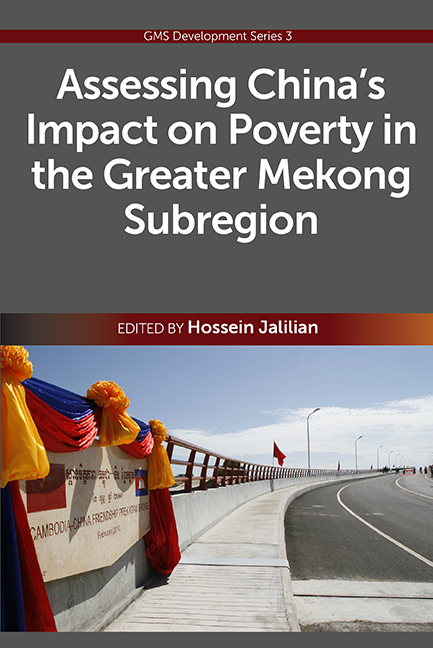Foreword
Published online by Cambridge University Press: 21 October 2015
Summary
This volume presents the findings of the Greater Mekong Subregion Development Analysis Network (GMS-DAN) research on “Assessing China's Impact on Poverty Reduction in the Greater Mekong Subregion”, which was undertaken through the generous support of the Rockefeller Foundation. GMS-DAN comprises leading development policy research institutes in Cambodia, Lao PDR, Thailand, Vietnam and Yunnan Province of China. Since its inception in 1997, GMS-DAN has undertaken collaborative research, and published research reports and associated publications, on a range of significant cross-border socio-economic issues for the GMS — the impact of the Asian financial crisis on the Southeast Asian transitional economies; labour markets in transitional economies in Southeast Asia and Thailand; off-farm and non-farm employment in Southeast Asian transitional economies and Thailand; the cross-border economies of Cambodia, Laos, Thailand and Vietnam; pro-poor tourism in the GMS; labour migration in the GMS; agricultural trade in the GMS; and, most recently, assessing China's impact on poverty reduction in the GMS.
GMS-DAN's vision is for a peaceful, prosperous and integrated Greater Mekong Subregion that has achieved inclusive growth and sustainable development for its peoples. GMS-DAN's mission is to collaborate effectively as a network of leading GMS development research institutions; to generate high-quality collaborative development policy research on issues of importance to the GMS; to disseminate it effectively to policy-makers and influencers; and to strengthen the capacity of its member institutes and researchers. GMS-DAN's researchers include both senior experienced researchers with decades of experience working on development issues in ASEAN and the GMS, and a younger generation of emerging researchers who are building their knowledge and skills at a time of rapid change and development in their own countries and in the broader region — economically, socially and geopolitically. Of all these changes, none has more significant implications for these countries, for the GMS, and for ASEAN and the broader East Asian region, than the re-emergence of China as a major regional and global economic and geopolitical power, and the deepening of its relations, both economically and strategically, with the countries of the GMS, particularly the least developed countries (LDCs), Cambodia, Lao PDR and Myanmar.
- Type
- Chapter
- Information
- Assessing China's Impact on Poverty in the Greater Mekong Subregion , pp. xix - xxiiPublisher: ISEAS–Yusof Ishak InstitutePrint publication year: 2013



